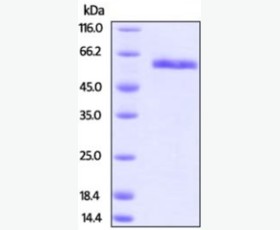Recombinant Human SMAD Family Member 4/SMAD4/DPC4
| Product name: | Recombinant Human SMAD Family Member 4/SMAD4/DPC4 |
| Source: | E.coli |
| Purity: | Greater than 95% as determined by reducing SDS-PAGE. |
| Buffer Formulation: | Lyophilized from a 0.2 μm filtered solution of 20mM TrisHCl,pH8.0. |
| Applications: | SDS-PAGE, Western Blot (WB), ELISA (EIA), Immunoprecipitation (IP) |
| Storage: | Avoid repeated freeze/thaw cycles. Store at 2-8 degree C for one month. Aliquot and store at -80 degree C for 12 months. |
| UOM: | 100ug/50ug/200ug/1mg/1g |
| Source | E.coli |
| Description | Recombinant Human SMAD4 is produced by our E.coli expression system and the target gene encoding Met1-Asp552 is expressed with a 6His tag at the C-terminus. |
| Names | Mothers Against Decapentaplegic Homolog 4, MAD Homolog 4, Mothers Against DPP Homolog 4, Deletion Target in Pancreatic Carcinoma 4, SMAD Family Member 4, SMAD 4, Smad4, hSMAD4, SMAD4, DPC4, MADH4 |
| Accession # | Q13485 |
| Formulation | Lyophilized from a 0.2 μm filtered solution of 20mM TrisHCl,pH8.0. |
| Shipping |
The product is shipped at ambient temperature. |
| Reconstitution |
Always centrifuge tubes before opening. Do not mix by vortex or pipetting. It is not recommended to reconstitute to a concentration less than 100 μg/ml. Dissolve the lyophilized protein in ddH2O. Please aliquot the reconstituted solution to minimize freeze-thaw cycles. |
| Storage |
Lyophilized protein should be stored at < -20°C, though stable at room temperature for 3 weeks. Reconstituted protein solution can be stored at 4-7°C for 2-7 days. Aliquots of reconstituted samples are stable at < -20°C for 3 months. |
| Purity |
Greater than 95% as determined by reducing SDS-PAGE. |
| Endotoxin | Less than 0.1 ng/µg (1 IEU/µg) as determined by LAL test. |
| Amino Acid Sequence |
MDNMSITNTPTSNDACLSIVHSLMCHRQGGESETFAKRAIESLVKKLKEKKDELDSLITAITTNG AHPSKCVTIQRTLDGRLQVAGRKGFPHVIYARLWRWPDLHKNELKHVKYCQYAFDLKCDSVCVNP YHYERVVSPGIDLSGLTLQSNAPSSMMVKDEYVHDFEGQPSLSTEGHSIQTIQHPPSNRASTETY STPALLAPSESNATSTANFPNIPVASTSQPASILGGSHSEGLLQIASGPQPGQQQNGFTGQPATY HHNSTTTWTGSRTAPYTPNLPHHQNGHLQHHPPMPPHPGHYWPVHNELAFQPPISNHPAPEYWCS IAYFEMDVQVGETFKVPSSCPIVTVDGYVDPSGGDRFCLGQLSNVHRTEAIERARLHIGKGVQLE CKGEGDVWVRCLSDHAVFVQSYYLDREAGRAPGDAVHKIYPSAYIKVFDLRQCHRQMQQQAATAQ AAAAAQAAAVAGNIPGPGSVGGIAPAISLSAAAGIGVDDLRRLCILRMSFVKGWGPDYPRQSIKE TPCWIEIHLHRALQLLDEVLHTMPIADPQPLDLEHHHHHH
|
| Background | SMAD Family Member 4 (SMAD4) is a cytoplasmic protein that belongs to the Dwarfin/SMAD family. SMAD4 contains one MH1 (MAD homology 1) domain and one MH2 (MAD homology 2) domain. It is the component of the heterotrimeric SMAD2/SMAD3-SMAD4 complex that forms in the nucleus and is required for the TGF-mediated signaling. SMAD4 promotes binding of the SMAD2/SMAD4/FAST-1 complex to DNA and provides an activation function required for SMAD1 or SMAD2 to stimulate transcription. SMAD4 may act as a tumor suppressor. It positively regulates PDPK1 kinase activity by stimulating its dissociation from the 14-3-3 protein YWHAQ which acts as a negative regulator. Mutations or deletions in SMAD4 have been shown to result in pancreatic cancer, juvenile polyposis syndrome, and hereditary hemorrhagic telangiectasia syndrome. |














